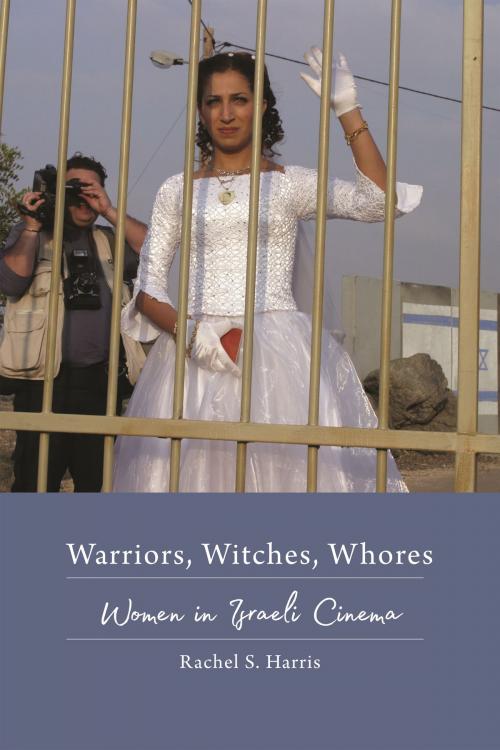Warriors, Witches, Whores
Women in Israeli Cinema
Fiction & Literature, Literary Theory & Criticism, Asian, Middle Eastern, Nonfiction, Entertainment, Film, History & Criticism, Performing Arts| Author: | Rachel S. Harris | ISBN: | 9780814339688 |
| Publisher: | Wayne State University Press | Publication: | November 15, 2017 |
| Imprint: | Wayne State University Press | Language: | English |
| Author: | Rachel S. Harris |
| ISBN: | 9780814339688 |
| Publisher: | Wayne State University Press |
| Publication: | November 15, 2017 |
| Imprint: | Wayne State University Press |
| Language: | English |
Warriors, Witches, Whores: Women in Israeli Cinema is a feminist study of Israel’s film industry and the changes that have occurred since the 1990s. Working in feminist film theory, the book adopts a cultural studies approach, considering the creation of a female-centered and thematically feminist film culture in light of structural and ideological shifts in Israeli society. Author Rachel S. Harris situates these changes in dialogue with the cinematic history that preceded them and the ongoing social inequalities that perpetuate women’s marginalization within Israeli society. While no one can deny Israel’s Western women’s advancements, feminist filmmakers frequently turn to Israel’s less impressive underbelly as sources for their inspiration. Their films have focused on sexism, the negative impact of militarism on women’s experience, rape culture, prostitution, and sexual abuse. These films also tend to include subjects from society’s geographical periphery and social margins, such as female foreign workers, women, and refugees. Warriors, Witches, Whoresis divided into three major sections and each considers a different form of feminist engagement. The first part explores films that situate women in traditionally male spheres of militarism, considering the impact of interjecting women within hegemonic spaces or reconceptualizing them in feminist ways. The second part recovers the narratives of women’s experience that were previously marginalized or silenced, thereby creating a distinct female space that offers new kinds of storytelling and cinematic aesthetics that reflect feminist expressions of identity. The third part offers examples of feminist activism that reach beyond the boundaries of the film to comment on social issues, particularly those which affect women. This section demonstrates how feminists use film (and work within the film industry) in order to women’s position in society. While there are thematic overlaps between the chapters, each section marks structural differences in the modes of feminist response. Warriors, Witches, Whores considers the ways social and political power have impacted the representation of women and looks to how feminist filmmakers have fought against these inequities behind the camera, in the stories they tell, and in the ways women are depicted on screen. Students and scholars of film, gender, or cultural studies will appreciate this approachable monograph.
Warriors, Witches, Whores: Women in Israeli Cinema is a feminist study of Israel’s film industry and the changes that have occurred since the 1990s. Working in feminist film theory, the book adopts a cultural studies approach, considering the creation of a female-centered and thematically feminist film culture in light of structural and ideological shifts in Israeli society. Author Rachel S. Harris situates these changes in dialogue with the cinematic history that preceded them and the ongoing social inequalities that perpetuate women’s marginalization within Israeli society. While no one can deny Israel’s Western women’s advancements, feminist filmmakers frequently turn to Israel’s less impressive underbelly as sources for their inspiration. Their films have focused on sexism, the negative impact of militarism on women’s experience, rape culture, prostitution, and sexual abuse. These films also tend to include subjects from society’s geographical periphery and social margins, such as female foreign workers, women, and refugees. Warriors, Witches, Whoresis divided into three major sections and each considers a different form of feminist engagement. The first part explores films that situate women in traditionally male spheres of militarism, considering the impact of interjecting women within hegemonic spaces or reconceptualizing them in feminist ways. The second part recovers the narratives of women’s experience that were previously marginalized or silenced, thereby creating a distinct female space that offers new kinds of storytelling and cinematic aesthetics that reflect feminist expressions of identity. The third part offers examples of feminist activism that reach beyond the boundaries of the film to comment on social issues, particularly those which affect women. This section demonstrates how feminists use film (and work within the film industry) in order to women’s position in society. While there are thematic overlaps between the chapters, each section marks structural differences in the modes of feminist response. Warriors, Witches, Whores considers the ways social and political power have impacted the representation of women and looks to how feminist filmmakers have fought against these inequities behind the camera, in the stories they tell, and in the ways women are depicted on screen. Students and scholars of film, gender, or cultural studies will appreciate this approachable monograph.















